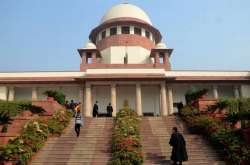The Supreme Court on Tuesday declined to keep in abeyance its March 20 order on the SC/ST Act but said it will consider in detail the Centre's review petition.
A bench of Justices A K Goel and U U Lalit, while referring to the large-scale nationwide violence during the protest against the verdict, said that people who are agitating have not read the judgment properly and have been misled by vested interests.
The bench also said it has not diluted any provision of SC/ST Act and only safeguarded the interest of innocents from being arrested.
However, the provisions of the Act cannot be used to terrorise the innocents, it said.
The top court listed the Centre's review petition after 10 days for detailed hearing and asked the Maharashtra government and others to file written submissions by then.
The union government, in its review petition, said the March 20 verdict has "wide ramification and implication resulting in dilution of the stringent provisions of law enacted under the 1989 enactment. It adversely affects a substantial portion of the population of India being the members of SC/ST. It is also contrary to the legislative policy of Parliament as reflected in the Prevention Of Atrocities Act 1989".
The top court had recently banned automatic arrests and registration of criminal cases under the Scheduled Castes and the Scheduled Tribes Prevention of Atrocities Act, 1989.
The law protects the marginalised communities against discrimination and atrocities.
A delegation of NDA's SC and ST MPs, led by LJP chief Ram Vilas Paswan and Gehlot, had met Prime Minister Narendra Modi on Wednesday to discuss the apex court judgement diluting provisions of the SC/ST atrocities act.
The National Commission for Scheduled Tribes (NCST) and the National Commission for Scheduled Castes (NCSC) have also conveyed their views and demanded a review of the verdict, saying the original Act, as it existed before the SC verdict, should be restored.
The Scheduled Castes (SCs) and the Scheduled Tribes (STs) Prevention of Atrocities (PoA) Act, 1989 was amended recently to include new offences and to ensure speedy justice to victims. The amended law had come into effect from January 26, 2016.
WATCH VIDEO:
Latest India News
